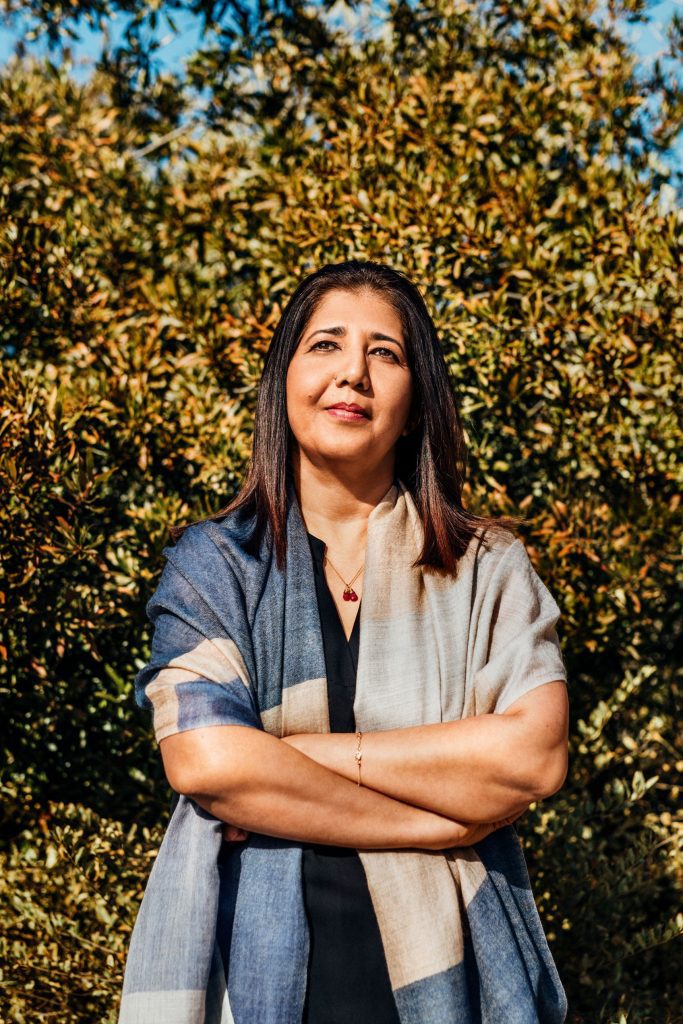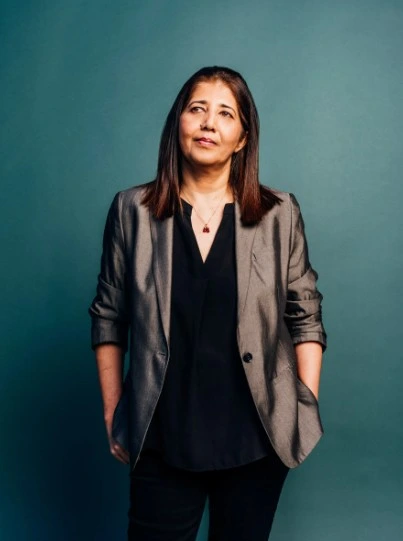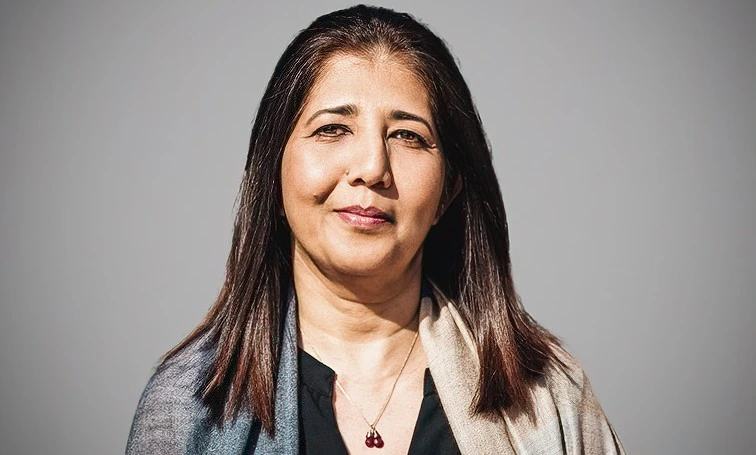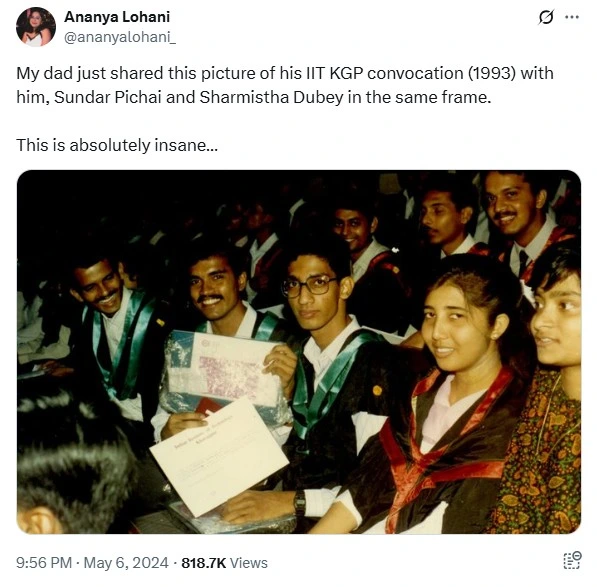(April 27, 2025) “You have to take a gamble.” That’s what Sharmistha ‘Shar’ Dubey told the CEO who questioned why someone with no background in consumer tech or online dating should be hired. He did. And that gamble revolutionized how millions find love today. Dubey played a key role in Tinder’s explosive growth, introducing features that made it one of the most popular dating apps in the world.
As the former CEO of Match Group, a leading global player in online dating that owns Tinder, Hinge, OkCupid, Meetic, Pairs, Hyperconnect, PlentyOfFish, and Match.com, Dubey’s rise from the small industrial city of Jamshedpur to Silicon Valley’s upper echelons is reflective of the Indian diaspora’s quiet but powerful ascent on the global stage.
Sharmistha Dubey navigated male-dominated spaces, decoding human emotions through data, and staying unapologetically authentic while rewriting the rules of romance in the digital age. The former CEO of Match Group currently serves on a number of public boards, and is an operating partner at a private equity firm, Advent International.

Sharmistha Dubey | Photo Credit: The Wall Street Journal
A lone girl at IIT Kharagpur’s metallurgical department
Born in 1970 in Jamshedpur to a mechanical engineering professor, Sharmistha Dubey was encouraged to pursue STEM long before it became a buzzword. In 1993, she graduated from IIT Kharagpur with a degree in metallurgical engineering, which was an unusual choice at the time, and even more so for a woman. In fact, she was the only girl in her class.
“There wasn’t even a women’s restroom on campus,” she told Vogue. “I would run over to my dorm every time I needed to use the restroom.”
One of her classmates was none other than Google CEO Sundar Pichai. An old convocation photo featuring both of them, shared on social media, sent ripples across the tech community, a serendipitous reminder of the extraordinary talent IIT Kharagpur nurtured.
Though Dubey had nearly dropped out in her first week as the only female in the metallurgical engineering department, she somehow stuck it out. That quiet resilience combined with a deeply introspective nature would later define her leadership style.
Crossing continents
After a brief stint at the steel company in Jamshedpur, Dubey saved enough to pursue a Master’s degree in the U.S. at Ohio State University. It was there that her life took two major turns. Academically, it became the launching pad for her career in tech, and personally, it reunited her with a fellow engineer from India, who would eventually become her husband.
The couple fell in love and got married after graduation, but Dubey insisted in an interview that her own love story didn’t shape her approach to matchmaking algorithms at Match. “What drives me is the optimism and growth that comes from a relationship,” she said. “I want everyone to find the kind of love that makes them better.”
Social anxiety to cupid-in-chief
Growing up, Dubey struggled with intense social anxiety. Yet that very discomfort helped her build an online dating empire. She became a quiet observer, studying how people made connections, aced small talk, and navigated relationships.
“I worked with cultural biological anthropologists and research scientists,” she said. “But my early curiosity about human interaction gave me a good advantage.”
It’s no surprise then that when she joined Match.com in 2006, she wasn’t just building products but was also decoding emotions. Her engineering mind and anthropological insight became a powerful combination.

Sharmistha Dubey | Photo Credit: Vogue
Tinder Gold and psychology of love
Dubey’s biggest triumph came when she served as COO of Tinder and introduced a feature called Likes You, which showed users who had already liked them. It was simple. It was genius. It was rooted in human psychology.
“We tend to like people more when we know they like us,” remarked the business executive. “So, the chances of that turning into a match becomes that much more.”
Only available to paid users under Tinder Gold, the feature exploded in popularity and directly fueled Tinder’s rise into a billion-dollar brand.
Earlier, she had experimented with Daily Five on Match.com which was a curated list of five profiles based on user behaviour. “It’s kind of like arranged marriage logic,” Dubey had explained. “Someone you trust telling you that you should like this person, and it works.”
From personal rebellion to data-driven matchmaking
Growing up, Dubey had little patience for arranged marriages. “I was expected to enter into one before completing my education,” she said. It was her father who stood by her dreams. Ironically, her algorithms at Match mimicked the very matchmaker aunties she once resisted.
“There’s a level of personality matching these aunties do,” she admitted with a laugh. “They’ll say ‘She’s flighty’ or ‘He’s grounded’”. These were however, the natural signals that her team eventually modeled through tech.
In her hands, centuries-old cultural instincts met cutting-edge algorithms.
Talking about her experiences of leading a dating app startup she mentioned, “Once I got in I thought it’s the perfect thing for me at the time because it allowed me to combine sociology, psychology, and Anthropology with technology and then have a pretty profound impact on people’s lives. Although I stumbled into it, I really enjoyed every bit of it.”

Sharmistha Dubey | Photo Credit: Wired
Leading through crisis
Climbing the ranks since joining in 2006, Dubey became CEO of Match Group in March 2020, just as COVID-19 hit. With physical boundaries blurred, people began seeking meaningful connections online and globally. Surprisingly, women were more active than ever before. “The isolation of the pandemic drove people to say, never again will I go through this alone.”
The pivot worked. Match Group ended the year with 17 percent higher revenue. And in a world reeling from loneliness, love became the most urgent currency.
Taking a stand for reproductive rights
Dubey’s leadership wasn’t just about products and profits. When the controversial Texas Heartbeat Act went into effect in 2021, she personally created a fund to support Match Group employees affected by the legislation. Officially known as Senate Bill 8 (SB 8), the law bans abortions in Texas once a fetal heartbeat is detected, typically around six weeks into pregnancy. It also permits citizens to sue anyone who performs or assists with such abortions.
“I am shocked that I now live in a state where women’s reproductive laws are more regressive than most of the world, including India,” she said. Importantly, she clarified it was a personal initiative, not on behalf of the company. It was a rare moment of corporate moral clarity, and it didn’t go unnoticed.
Beyond Match
After stepping down as CEO in May 2022, Dubey has remained a director at Match Group and also joined the board of Fortive Corporation. She is also a board member at Naspers and Prosus, and serves as an operating partner at Advent International alongside Mandy Ginsberg, the American businesswoman and executive who preceded Dubey as CEO of Match Group.

Sharmistha Dubey | Photo Credit: Match
Sharmishtha Dubey’s post-Match years mark not a retreat but a strategic expansion. As one of the few Indian-origin women influencing corporate America at the board level, her impact continues to grow.
Sharmistha Dubey is more than just a tech executive, she exemplifies the diasporic evolution, where cultural roots, global ambition, and feminist values intersect. Her journey from being the lone girl in an IIT metallurgy class to becoming the architect of a global love platform, and subsequently being on board of several companies speaks volumes about quiet perseverance and reinvention of her persona.
ALSO READ: Tale of Two Sisters: Grammy winner Chandrika Tandon and business leader Indra Nooyi’s global impact




